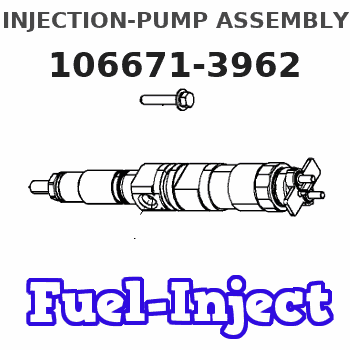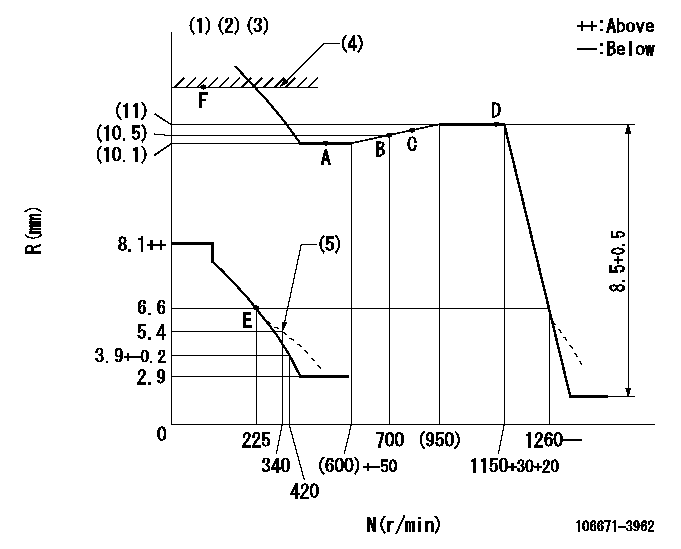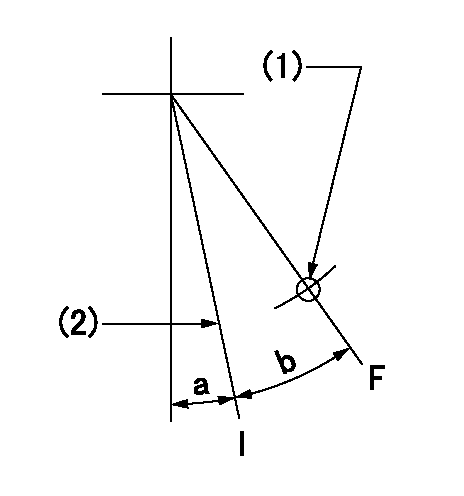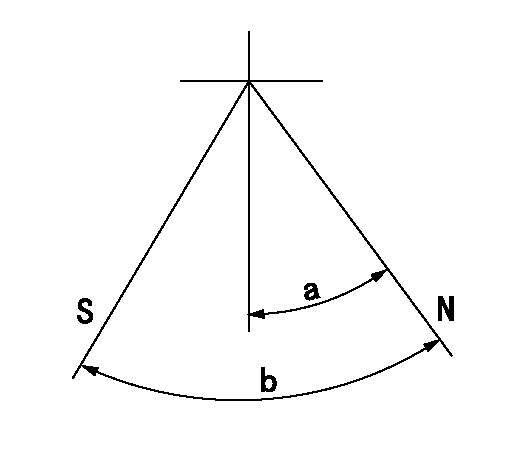Information injection-pump assembly
ZEXEL
106671-3962
1066713962
HINO
220005031A
220005031a

Rating:
Service parts 106671-3962 INJECTION-PUMP ASSEMBLY:
1.
_
7.
COUPLING PLATE
8.
_
9.
_
11.
Nozzle and Holder
23600-1221
12.
Open Pre:MPa(Kqf/cm2)
21.6{220}
15.
NOZZLE SET
Include in #1:
106671-3962
as INJECTION-PUMP ASSEMBLY
Cross reference number
ZEXEL
106671-3962
1066713962
HINO
220005031A
220005031a
Zexel num
Bosch num
Firm num
Name
Calibration Data:
Adjustment conditions
Test oil
1404 Test oil ISO4113 or {SAEJ967d}
1404 Test oil ISO4113 or {SAEJ967d}
Test oil temperature
degC
40
40
45
Nozzle and nozzle holder
105780-8140
Bosch type code
EF8511/9A
Nozzle
105780-0000
Bosch type code
DN12SD12T
Nozzle holder
105780-2080
Bosch type code
EF8511/9
Opening pressure
MPa
17.2
Opening pressure
kgf/cm2
175
Injection pipe
Outer diameter - inner diameter - length (mm) mm 8-3-600
Outer diameter - inner diameter - length (mm) mm 8-3-600
Overflow valve
134424-0920
Overflow valve opening pressure
kPa
162
147
177
Overflow valve opening pressure
kgf/cm2
1.65
1.5
1.8
Tester oil delivery pressure
kPa
157
157
157
Tester oil delivery pressure
kgf/cm2
1.6
1.6
1.6
Direction of rotation (viewed from drive side)
Left L
Left L
Injection timing adjustment
Direction of rotation (viewed from drive side)
Left L
Left L
Injection order
1-4-2-6-
3-5
Pre-stroke
mm
3.3
3.24
3.3
Beginning of injection position
Drive side NO.1
Drive side NO.1
Difference between angles 1
Cal 1-4 deg. 60 59.75 60.25
Cal 1-4 deg. 60 59.75 60.25
Difference between angles 2
Cyl.1-2 deg. 120 119.75 120.25
Cyl.1-2 deg. 120 119.75 120.25
Difference between angles 3
Cal 1-6 deg. 180 179.75 180.25
Cal 1-6 deg. 180 179.75 180.25
Difference between angles 4
Cal 1-3 deg. 240 239.75 240.25
Cal 1-3 deg. 240 239.75 240.25
Difference between angles 5
Cal 1-5 deg. 300 299.75 300.25
Cal 1-5 deg. 300 299.75 300.25
Injection quantity adjustment
Adjusting point
A
Rack position
10.1+-0.
5
Pump speed
r/min
500
500
500
Average injection quantity
mm3/st.
119.5
116.5
122.5
Max. variation between cylinders
%
0
-4
4
Fixing the lever
*
Injection quantity adjustment_02
Adjusting point
B
Rack position
10.5+-0.
5
Pump speed
r/min
700
700
700
Average injection quantity
mm3/st.
129.5
127.5
131.5
Max. variation between cylinders
%
0
-2
2
Basic
*
Fixing the lever
*
Injection quantity adjustment_03
Adjusting point
D
Rack position
11+-0.5
Pump speed
r/min
1150
1150
1150
Average injection quantity
mm3/st.
143
140
146
Max. variation between cylinders
%
0
-4
4
Fixing the lever
*
Injection quantity adjustment_04
Adjusting point
E
Rack position
6.6+-0.5
Pump speed
r/min
225
225
225
Average injection quantity
mm3/st.
15
12
18
Max. variation between cylinders
%
0
-10
10
Fixing the rack
*
Injection quantity adjustment_05
Adjusting point
F
Rack position
11.6+-0.
5
Pump speed
r/min
100
100
100
Average injection quantity
mm3/st.
126.3
119.3
133.3
Fixing the lever
*
Rack limit
*
Timer adjustment
Pump speed
r/min
750--
Advance angle
deg.
0
0
0
Remarks
Start
Start
Timer adjustment_02
Pump speed
r/min
700
Advance angle
deg.
0.5
Timer adjustment_03
Pump speed
r/min
900
Advance angle
deg.
1.4
0.9
1.9
Timer adjustment_04
Pump speed
r/min
1150
Advance angle
deg.
4
3.5
4.5
Remarks
Finish
Finish
Test data Ex:
Governor adjustment

N:Pump speed
R:Rack position (mm)
(1)Lever ratio: RT
(2)Target shim dimension: TH
(3)Tolerance for racks not indicated: +-0.05mm.
(4)RACK LIMIT
(5)Damper spring setting
----------
RT=1 TH=2.6mm
----------
----------
RT=1 TH=2.6mm
----------
Speed control lever angle

F:Full speed
----------
----------
a=3deg+-5deg
----------
----------
a=3deg+-5deg
0000000901

F:Full load
I:Idle
(1)Use the hole at R = aa
(2)Stopper bolt setting
----------
aa=75mm
----------
a=1deg+-5deg b=(28deg)+-3deg
----------
aa=75mm
----------
a=1deg+-5deg b=(28deg)+-3deg
Stop lever angle

N:Pump normal
S:Stop the pump.
----------
----------
a=40deg+-5deg b=64deg+-5deg
----------
----------
a=40deg+-5deg b=64deg+-5deg
0000001501 GOVERNOR TORQUE CONTROL

Dr:Torque control stroke
(A): Without torque control spring capsule
1. Adjustment procedures
(1)Procedure is the same as that for the RFD (former type), except that the positive torque control stroke must be determined at the full lever setting.
2. Procedures for adjustment
(1)Remove the torque control spring capsule.
(2)Operate the pump at approximately N1. (End of idling spring operation < N1.)
(3)Tilt the lever to the full side.
(4)Set so that R = RF.
(5)Increase the speed by pushing in the screw (attached to the bracket on the rear of the tension lever) through the adjusting window.
(6)Adjust so that the torque control stroke Dr1 can be obtained.
(7)Align N2 and N3 with the torque control spring capsule.
3. Final confirmation
(1)After final confirmation, temporarily set the load lever to N = N1, R = idling position.
(2)From this condition, increase speed to N = N4.
(3)Confirm that positive torque control stroke is Dr2.
----------
N1=500r/min N2=(600)+-50r/min N3=(950)r/min N4=1000r/min RF=(10.1)mm Dr1=0.9mm Dr2=0+0.3mm
----------
----------
N1=500r/min N2=(600)+-50r/min N3=(950)r/min N4=1000r/min RF=(10.1)mm Dr1=0.9mm Dr2=0+0.3mm
----------
Timing setting

(1)Pump vertical direction
(2)Coupling's key groove position at No 1 cylinder's beginning of injection
(3)-
(4)-
----------
----------
a=(0deg)
----------
----------
a=(0deg)
Information:
Coolant Level Sensor (If supplied by Vehicle Manufacturer)
Determines if the System monitors the coolant level sensor input.* Enabled (As shipped by Caterpillar)* Disabled (Programmable)The engine functions that are monitored have the following parameters. If there is a coolant loss signal, there will be a 10 second delay to verify the condition, then the system will derate the engine for 40 seconds before shutdown.If there is low oil pressure or coolant temperature signal, there will be a 2 second delay to verify the condition, then the system will derate the engine for 30 seconds before shutdown.Customer Specified Parameters
The Electronic system is capable of being programmed for several customer specified parameters. These parameters are generally programmed so the vehicle will achieve optimum fuel efficiency and operator convenience.Customer Specified Parameters allow the owner/customer to limit how a driver operates the vehicle. The parameters may be changed as often as needed to conform to the customers' operation or as new drivers are assigned to a particular truck. The customer specified parameters require Customer Passwords to change the parameters.Some parameters may affect engine operation and lead to driver complaints about power or performance, even though the engine is performing to specification. For detailed instructions on how to program the 3406C Electronic for optimum performance and fuel economy, refer to Specing for Peak Performance, LEKT8467.The engine includes the features of programmable low idle and top engine limiting (TEL). Cruise control, PTO governing, vehicle speed limiting, (progressive shift control), retarder coast/latch and idle shutdown timer are also available depending on OEM truck configurations. Low idle and top engine rpm limits are customer programmable to promote maximum fuel efficiency. The 3406C Electronic system allows the owner to select power ratings within a "family" to more efficiently match the vehicle to the application. The Customer Specified Parameters available and a brief explanation of each follows. Engine Rating Number- Number of rating within horsepower family. The Personality Module defines the horsepower family and may contain several ratings within that family. The rating number defines which rating is used within that family. Several power ratings can be selected depending on the horsepower (kW) family of the engine. Vehicle Identification Number- The owner's description, or unit number of the vehicle. (Only for customer reference; not required by ECM.) PTO Mode Speed Limit (PTO)- Maximum vehicle speed at which the PTO Governor will function (between 0 and 15 mph [0 and 24 km/h]). If vehicle speed signal exceeds the programmed value, the control will exit the PTO Mode. PTO Mode RPM Limit (PTO RPM)- Maximum engine rpm attainable in the PTO Mode. The rpm limits are between 600 and 3000 rpm. PTO Engine Speed Ramp Rate- Engine rpm (speed) rate of increase. This parameter determines ACCEL, DECEL and RESUME PTO Engine rates of increase/decrease. The programmable limits are between 50 rpm/second and 500 rpm/second. Low Gears #1 RPM Limit (LoGr #1)- Engine speed is limited below Low Gear #1 Turn Off Speed. The engine will hesitate at this speed then allow
Determines if the System monitors the coolant level sensor input.* Enabled (As shipped by Caterpillar)* Disabled (Programmable)The engine functions that are monitored have the following parameters. If there is a coolant loss signal, there will be a 10 second delay to verify the condition, then the system will derate the engine for 40 seconds before shutdown.If there is low oil pressure or coolant temperature signal, there will be a 2 second delay to verify the condition, then the system will derate the engine for 30 seconds before shutdown.Customer Specified Parameters
The Electronic system is capable of being programmed for several customer specified parameters. These parameters are generally programmed so the vehicle will achieve optimum fuel efficiency and operator convenience.Customer Specified Parameters allow the owner/customer to limit how a driver operates the vehicle. The parameters may be changed as often as needed to conform to the customers' operation or as new drivers are assigned to a particular truck. The customer specified parameters require Customer Passwords to change the parameters.Some parameters may affect engine operation and lead to driver complaints about power or performance, even though the engine is performing to specification. For detailed instructions on how to program the 3406C Electronic for optimum performance and fuel economy, refer to Specing for Peak Performance, LEKT8467.The engine includes the features of programmable low idle and top engine limiting (TEL). Cruise control, PTO governing, vehicle speed limiting, (progressive shift control), retarder coast/latch and idle shutdown timer are also available depending on OEM truck configurations. Low idle and top engine rpm limits are customer programmable to promote maximum fuel efficiency. The 3406C Electronic system allows the owner to select power ratings within a "family" to more efficiently match the vehicle to the application. The Customer Specified Parameters available and a brief explanation of each follows. Engine Rating Number- Number of rating within horsepower family. The Personality Module defines the horsepower family and may contain several ratings within that family. The rating number defines which rating is used within that family. Several power ratings can be selected depending on the horsepower (kW) family of the engine. Vehicle Identification Number- The owner's description, or unit number of the vehicle. (Only for customer reference; not required by ECM.) PTO Mode Speed Limit (PTO)- Maximum vehicle speed at which the PTO Governor will function (between 0 and 15 mph [0 and 24 km/h]). If vehicle speed signal exceeds the programmed value, the control will exit the PTO Mode. PTO Mode RPM Limit (PTO RPM)- Maximum engine rpm attainable in the PTO Mode. The rpm limits are between 600 and 3000 rpm. PTO Engine Speed Ramp Rate- Engine rpm (speed) rate of increase. This parameter determines ACCEL, DECEL and RESUME PTO Engine rates of increase/decrease. The programmable limits are between 50 rpm/second and 500 rpm/second. Low Gears #1 RPM Limit (LoGr #1)- Engine speed is limited below Low Gear #1 Turn Off Speed. The engine will hesitate at this speed then allow
